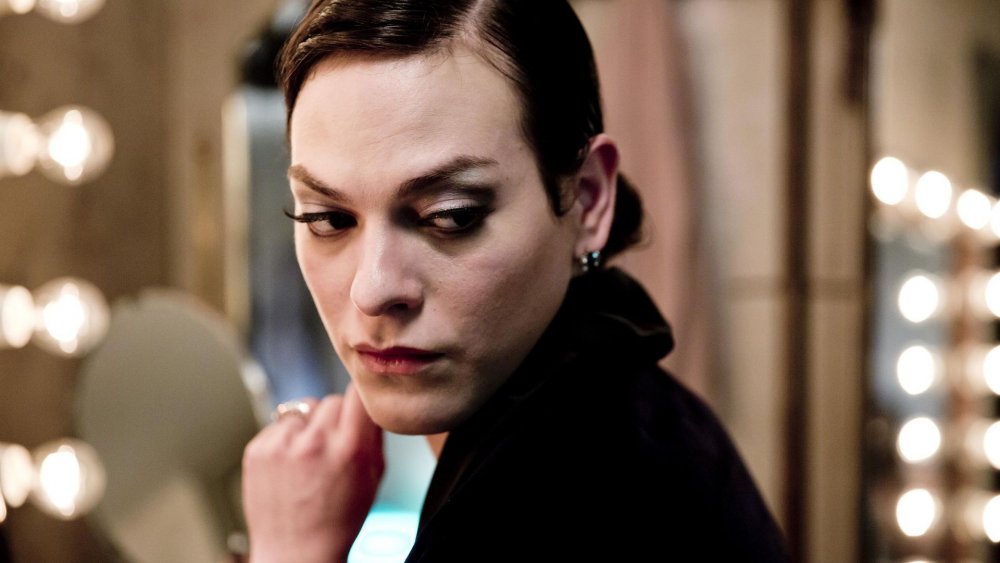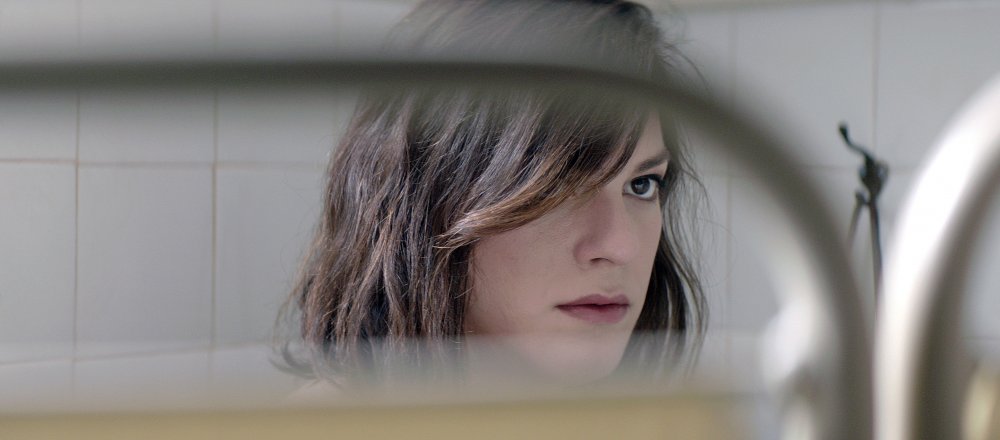Spoiler alert: this review reveals a plot twist
The viewer first encounters Marina Vidal (Daniela Vega), the defiant, enigmatic protagonist of Sebastián Lelio’s fifth feature, as she sings a jaunty 1970s number immortalised by Puerto Rican salsa star Héctor Lavoe. “Your love is yesterday’s newspaper,” she serenades, sharing complicit glances with the man identified as her partner, Orlando (Francisco Reyes), the 57-year-old owner of a textile company who has come to the hotel club where she is singing to pick her up for dinner. The film’s opening scenes focus on Orlando in both work (office) and leisure (sauna) spaces, leading the viewer to believe he is to be the film’s protagonist – one of numerous false pointers impishly dropped into the screenplay. It is, however, Marina who quickly takes over as the film’s lead as she deals with the aftermath of Orlando’s sudden demise.
Chile/USA/Germany/Spain 2017
Certificate 15; 104m 17s
Director Sebastián Lelio
Cast
Marina Vidal Daniela Vega
Orlando Onetto Pertier Francisco Reyes
Gabriel Onetto ‘Gabo’ Luis Gnecco
Sonia Aline Küppenheim
Bruno Nicolás Saavedra
Adriana Cortés Amparo Noguera
Doctor Alejandro Goic
Chilean theatrical title Una mujer fantástica
UK release date 2 March 2018 in cinemas and online
Distributor Curzon Artificial Eye
curzonartificialeye.com/a-fantastic-woman
► Trailer
Early sequences work to establish the relaxed intimacy of the couple’s relationship: the informal birthday dinner at a Chinese restaurant; their tender dance; the passion of their lovemaking back at Orlando’s flat. They are palpably at ease in each other’s company. But from the moment Orlando suffers an aneurysm 12 minutes into the film, everything changes. Marina, a trans woman, is shut out of his affairs by both his family and by the authorities: framed peering through the window of the hospital emergency room where Orlando is being treated; left standing in a space designated an ‘área sucia’ (dirty area); made to leave the apartment she shared with Orlando; confronted and thrown out of his wake at the pointedly titled Church of the Sacred Family.
Both the narrative and the camerawork seek to signpost Marina’s grief: as she opens Orlando’s wardrobe, she buries her head in his clothes to take in his scent; as she drives, the focus on the empty car seat where he once sat physicalises the absence in her life. Lelio also ruptures the realist veneer of the film by showing how Orlando continues to haunt Marina’s everyday activities: we see his reflection in her sunglasses; sitting in the back of her car at the carwash, or standing in the crowds at a noisy discotheque; or guiding her into the crematorium to bid farewell to his corpse. The void is made all too tangible. Orlando’s ex-wife Sonia (Aline Küppenheim) may see Marina and Orlando’s relationship as perverse – referring to it as a soap opera, which she contrasts with her own ‘normal’ past with him – but the film’s play with authenticity and reality ultimately undermines any fixed ideas about what constitutes the normal or the natural.
A Fantastic Woman is, in many ways, a tale of emotional survival in the wake of verbal, physical and psychological abuse. Undermined, ostracised and even criminalised, Marina is made to feel a social pariah – by the doctor (Alejandro Goic) who informs her of Orlando’s death, asking if ‘Marina Vidal’ is her nickname; and by Cortés (Amparo Noguera), the female detective from the sexual offences unit, who assumes that theirs was a violent, abusive relationship. “You don’t need to treat me like a criminal,” she tells the doctor, who has asked the police to bring her back in after she runs out of the hospital in shock. The frequent side-view filming of these encounters points to a confrontational hostility that marginalises Marina, repeatedly pushing her out of conversations. The complicit mutterings between the policeman and the doctor at the hospital find a later echo in the whispered encounter between Cortés and the forensic services doctor who is asked to examine Marina.

“I don’t want uniforms,” Marina tells her sister and brother-in-law. “I don’t want anything.” Her actions, however, demonstrate that she does want something: respect, recognition as a woman, and the chance to say goodbye to a loved one. Orlando’s brother Gabo (Neruda’s Luis Gnecco) offers her some of Orlando’s ashes as a compromise for staying away from the wake, but she refuses these crumbs from the official family table.
Orlando’s son Bruno (Nicolás Saavedra) is more candid in his exclusion of her. He insults her as a “faggot and monster”, bundling her with the help of his friends into a pick-up truck and disfiguring her face with Sellotape to create a physical manifestation of the image he has of her. “I don’t know what you are,” he says, as he pins her to the wall of his father’s apartment. Sonia informs her that “when I look at you, I don’t know what I’m seeing… a chimera”. The film’s reflective surfaces – mirrors, car windows, sunglasses – present Marina through multiple perspectives, further reinforcing the different dimensions that Orlando’s family refuses to see. Marina’s fluid identity is shown to threaten the interests of a social order whose power structure is based on absolutes.
In Marina, A Fantastic Woman has a lead whose earthy pragmatism and sense of decency evoke the upbeat Gloria, the title protagonist of Lelio’s 2013 feature. Both seek release in the pulsating beat of neon-lit discos, and both are marked by a dignity and sense of self-worth that sees them take justice into their own hands. Marina climbing on to the roof of Sonia, Bruno and Gabo’s car to demand the return of Orlando’s dog Diabla recalls Gloria’s paintball attack on the house of her cowardly, duplicitous lover Rodolfo. Like Gloria, Marina features in pretty much every frame from the moment she enters the film. “I’ll survive,” Marina tells her sister and, like Gloria, survive she does.
Daniela Vega’s performance as Marina is both luminous and contained. “Always so mysterious,” her boss at the restaurant observes, and Marina carries her grief with dignity, composure and self-control. To those who address her by her birth name Daniel, she defiantly responds: “My name is Marina.” It’s a line she repeats on numerous occasions to all those who refuse to accept who she is.

Lelio and his director of photography Benjamín Echazarreta choose to present the film firmly from Marina’s perspective. The widescreen compositions afford her a dignity that the authorities deny her. At the hospital, the door of the toilet cubicle acts as a buffer as she collapses in a crumpled heap, tightly holding a plastic bag containing Orlando’s possessions. During the medical examination she is forced to undergo, the film shies away from capturing the more intimate and invasive part of the procedure. Instead the camera affords the viewer the chance to get to know Marina, at first keeping its distance, then gradually moving closer, placing us in the car next to her or walking beside her as the narrative progresses; it lingers briefly on the merry-go-round outside the window when Cortés first asks her about the injuries sustained by Orlando as he fell down the stairway while she was trying to get him to hospital, providing an effective metaphor for the situation Marina now finds herself in.
Lelio’s deployment of fantasy sequences further provides a mode of articulating her state of mind. We watch her physically soar on two occasions: the first battling a windstorm on her way home, her body arching upwards as if walking on air; the second at a nightclub late on in the film, when she floats in the air, leading a choreographed sequence in a magnificent gold and silver tinsel outfit.
The soundtrack merges Matthew Herbert’s luscious score, dominated by long legato string phrases, with melodies that act as a further commentary on the action: Aretha Franklin’s (You Make Me Feel Like) A Natural Woman as Marina returns Orlando’s car to his ex-wife; The Alan Parsons Project’s Time as Marina and Orlando dance after her birthday dinner; Marina’s soaring rendition of Geminiano Giacomelli’s 1734 Sposa son disprezzata aria narrated from the point of view of a faithful but insulted wife, and the uplifting Ombra mai fu aria she sings from Handel’s Xerxes, which closes the film. The last functions as a fitting homage to the man she has loved and lost, and is gloriously rendered, like Lelio’s accomplished and deeply moving film, with shifting harmonies, gusto, poise and heartfelt emotion.
-
Sight & Sound: the March 2018 issue

Greta Gerwig on Lady Bird, plus girl friends in the movies, The Shape of Water, Loveless, The Touch, A Fantastic Woman, Dark River and our...
-
The Digital Edition and Archive quick link
Log in here to your digital edition and archive subscription, take a look at the packages on offer and buy a subscription.












